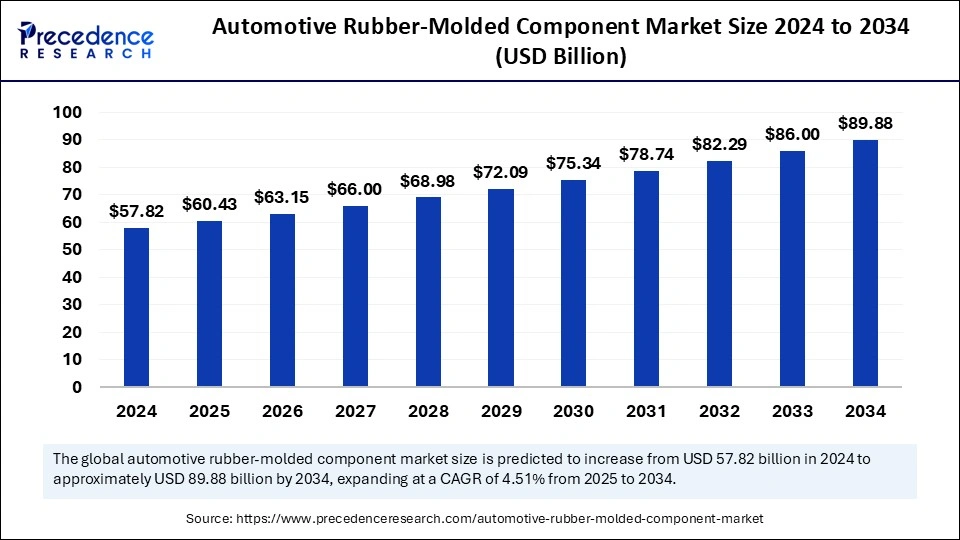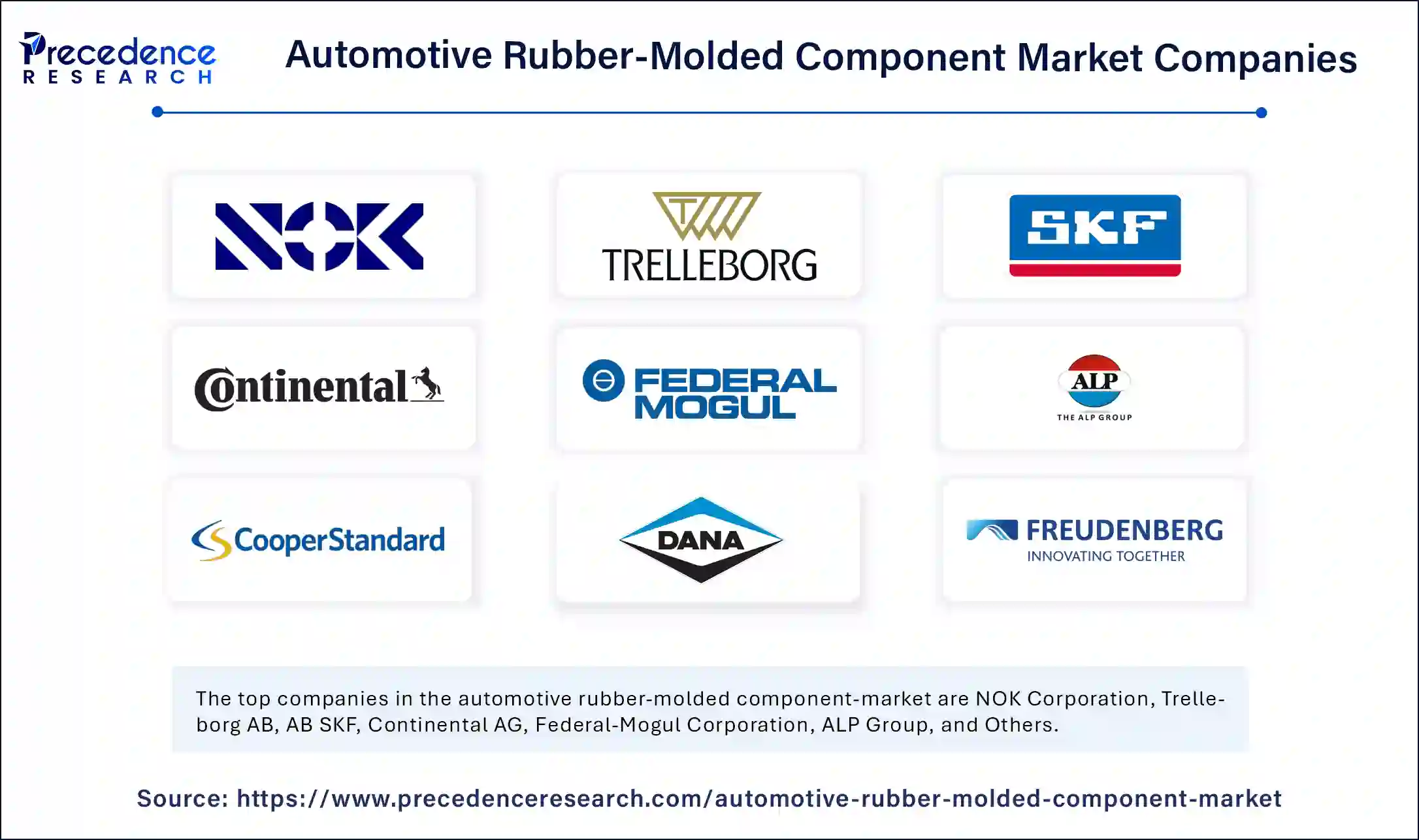Automotive Rubber-Molded Component Market Size to Worth USD 89.88 Bn by 2034
Automotive Rubber-Molded Component Market Size and Forecast
The global automotive rubber-molded component market size was valued at USD 57.82 billion in 2024 and is expected to worth around USD 89.88 billion by 2034, growing at a CAGR of 4.51% from 2025 to 2034.

Get Sample Copy of Report@ https://www.precedenceresearch.com/sample/5738
Key Points
-
In 2024, the Asia Pacific region emerged as the market leader.
-
North America is expected to witness substantial growth during the forecast timeline.
-
The EPDM segment accounted for the highest share by material in 2024.
-
The SBR segment is poised for strong growth throughout the projected period.
-
Among components, seals held the dominant share in 2024.
-
The gaskets segment is anticipated to expand at a noteworthy rate.
-
Passenger cars remained the leading vehicle type in 2024.
-
The commercial vehicles segment is on track to experience rapid market growth.
AI’s Impact on the Future of the Automotive Rubber-Molded Component Market
-
AI helps in real-time monitoring of production lines, reducing downtime and maximizing output.
-
Predictive AI analytics assist in forecasting market trends, helping manufacturers make data-driven decisions.
-
AI-enhanced material science research accelerates the development of eco-friendly rubber compounds.
-
AI-powered autonomous systems ensure precise molding and reduce variations in product dimensions.
-
Smart AI-driven logistics improve supply chain efficiency, reducing delays and production bottlenecks.
Automotive Rubber-Molded Component Market Overview
The automotive rubber-molded component market is experiencing steady growth due to rising vehicle production and increasing demand for durable, high-performance components. These components play a crucial role in ensuring vehicle safety, efficiency, and durability. Advances in rubber compounds, coupled with innovations in manufacturing technologies, are driving the market forward. Additionally, the push for lightweight materials in vehicles to enhance fuel efficiency is boosting the demand for rubber-molded components.
Also Read: Rail Glazing Market
Automotive Rubber-Molded Component Market Scope
| Report Coverage | Details |
| Market Size by 2034 | USD 89.88 Billion |
| Market Size in 2025 | USD 60.43 Billion |
| Market Size in 2024 | USD 57.82 Billion |
| Market Growth Rate from 2025 to 2034 | CAGR of 4.51% |
| Dominated Region | Asia Pacific |
| Fastest Growing Market | North America |
| Base Year | 2024 |
| Forecast Period | 2025 to 2034 |
| Segments Covered | Material Type, Component Type, Vehicle Type, and Regions |
| Regions Covered | North America, Europe, Asia-Pacific, Latin America and Middle East & Africa |
Market Dynamics
Market Drivers
Key drivers fueling the market include the expansion of the automotive industry, stringent emission regulations, and the growing adoption of electric vehicles (EVs). The demand for high-performance sealing solutions, vibration dampeners, and weatherproofing components has surged due to advancements in vehicle design and increasing safety concerns. Moreover, the integration of AI and automation in manufacturing processes has improved product quality and efficiency, further accelerating market growth.
Opportunities
The shift toward electric and hybrid vehicles presents significant opportunities for the automotive rubber-molded component market. Manufacturers are developing innovative rubber materials that can withstand high temperatures and electrical insulation requirements. Additionally, the rising focus on sustainable and recyclable rubber products is opening new growth avenues. Expanding markets in developing regions, where automotive production is increasing, also present lucrative prospects for industry players.
Challenges
Despite growth opportunities, the industry faces several challenges. Fluctuating raw material prices and supply chain disruptions impact production costs and profit margins. The industry also needs to address concerns regarding the environmental impact of rubber waste and develop sustainable solutions. Furthermore, competition from alternative materials such as advanced polymers may pose a challenge to market expansion.
Regional Insights
The Asia Pacific region dominates the market due to its strong automotive manufacturing base in countries like China, Japan, and India. The region benefits from high vehicle production rates and increasing investments in electric mobility. North America is witnessing steady growth, driven by advancements in automotive technology and a strong focus on sustainability. Europe is also a key player, supported by stringent regulations on emissions and safety standards, which drive the demand for high-quality rubber components.
Recent Developments
- In December 2024, Pricol, an automotive components maker, announced its plan to acquire Sundaram Auto Components’ injection molding business for Rs 215 crore. The company stated that it is acquiring its wholly-owned subsidiary, Pricol Precision Products Pvt Ltd.
- In June 2024, Celanese announced the expansion of its portfolio of materials for automotive boots and bellows. New solutions include multiple sustainable materials and a new grade suitable for injection molding of these parts. New materials aimed at achieving performance requirements while reducing the carbon footprint.
Automotive Rubber-Molded Component Market Companies

- NOK Corporation
- Trelleborg AB
- AB SKF
- Continental AG
- Federal-Mogul Corporation
- ALP Group
- Bohra Rubber Pvt. Ltd
- Cooper-Standard Automotive
- DANA Holding Corporation
- Freudenberg and Co. Kg
- Hebei Shinda Seal Group
- Hutchinson SA
- Steele Rubber Products
- Sumitomo Riko Co. Ltd
- Jayem Auto Industries Pvt Ltd
- Bony Polymers Pvt Ltd
Segments Covered in the Report
By Material Type
- Ethylene Propylene Diene Monomer (EPDM)
- Natural Rubber (NR)
- Styrene-butadiene Rubber (SBR)
- Others
By Component Type
- Seals
- Gaskets
- Hoses
- Weather-strips
- Others
By Vehicle Type
- Passenger Cars
- Commercial Vehicles
By Region
- North America
- Europe
- Asia Pacific
- Latin America
- Middle East and Africa (MEA)
Source: https://www.precedenceresearch.com/
